This article was medically reviewed by Mark Ziats, MD, PhD. Dr. Mark Ziats is an Internal Medicine Physician, Scientist, Entrepreneur, and the Medical Director of xBiotech. With over five years of experience, he specializes in biotechnology, genomics, and medical devices. He earned a Doctor of Medicine degree from Baylor College of Medicine, a Ph.D. in Genetics from the University of Cambridge, and a BS in Biochemistry and Chemistry from Clemson University. He also completed the INNoVATE Program in Biotechnology Entrepreneurship at The Johns Hopkins University - Carey Business School. Dr. Ziats is board certified by the American Board of Internal Medicine.
There are 8 references cited in this article, which can be found at the bottom of the page.
wikiHow marks an article as reader-approved once it receives enough positive feedback. In this case, 90% of readers who voted found the article helpful, earning it our reader-approved status.
This article has been viewed 390,495 times.
Enterobiasis, also known as pinworms or threadworms, are a type of parasite that can infect and live in the intestines. Pinworms are a real problem for children. Learn how to kill pinworms so you can treat them if your child or someone else in your home is infected.
Steps
Treating the Pinworms
-
1Diagnose pinworms. One of the easiest ways to diagnose a pinworm infection is to use the tape test. Take a piece of clear cellophane tape and wrap it around your fingers with the sticky side out. As soon as your child wakes up, firmly press the sticky tape on the skin around the anus. The eggs will stick to the tape.[1]
- Keep the tape and put it immediately into a sealed baggie. Remember, the tape is infectious and can spread eggs to other people.
- Make sure you perform the tape test before your child uses the toilet or bathes. Some physicians recommend the tape test three mornings in a row, but chances are good that one test will be enough.
-
2Visit the doctor. Even if you see eggs on the tape, take your child or the infected person to the doctor. A doctor can verify that the infection is pinworms and not something else. Bring the tape with you to show your child’s doctor.[2]
- The doctor can place the tape under a microscope to determine if there are pinworm eggs on the tape.
Advertisement -
3Treat the pinworms with medicine. Pinworm infections can be treated with two doses of medicine. The first batch of medicine is given when the pinworms are discovered. The second one is repeated two weeks later. This is to make sure all the adults that have hatched since the first dose are killed, because the medicine is ineffective in killing pinworm eggs.[3]
- Everyone in the household should be treated at the same time.
- Common medications used are mebendazole, pyrantel pamoate, and albendazole. Pyrantel pamoate is available as an over-the-counter medication. The others are available as prescriptions. Discuss with your doctor which medicine he suggests that is right for your infection.
Using Unverified Alternative Methods
-
1Understand the limitations of natural remedies. It is important to note that these alternative remedies are not backed by scientific evidence — evidence that they work is anecdotal, or based on personal experience and word of mouth. Without scientific studies to prove they are effective, there is no way to know if alternative treatments are helpful at all in treating pinworm.
- If you want to try an alternative method, talk to your doctor first. These alternative methods should still be undertaken in combination with medication from your doctor, and should not considered to be medical therapies by themselves.
-
2Use garlic. Garlic is thought to be a good home remedy to help get rid of pinworms. First, eat lots of fresh garlic. The garlic may help reduce and kill the pinworms when you have a bowel movement. You can also make a garlic paste to apply around the anal area. The garlic may kill the eggs and the oil will help soothe the itching.
- To make the paste, crush two to three cloves of fresh garlic. Add a few teaspoons of castor oil or mineral oil. Make sure you add enough to get a paste-like consistency. You can also make a paste by adding garlic to petroleum jelly.
- Make sure to discuss home remedies with your doctor before using them.
-
3Try turmeric. Turmeric has been shown in lab studies to kill parasites, though researchers are unsure if it kills parasites in humans; however, spicy foods, such as turmeric, are thought to be an effective cure against pinworms. Take 300 mg of turmeric in the form of a capsule three times a day.
- You may also consider making a tea with turmeric. Steep one teaspoon of turmeric in one cup of hot water for five to 10 minutes. Drink two to four cups.
- Don't take turmeric if you use blood thinners because it increases the risk of bleeding.
-
4Drink wormwood tea. The wormwood herb has been traditionally used to help expel worms from the digestive tract. Add a three to four drops of wormwood tincture to a cup of warm water. Have your child drink one cup a day. Adults can drink two cups a day.
- Talk to your doctor before using wormwood.
- Don't take wormwood if you take anti-seizure medication. If you are allergic to ragweed, you may also be allergic to wormwood.
Preventing Reinfection
-
1Wash your hands. Everyone in the house needs to wash their hands often. You should especially wash your hands after doing a tape test or after coming in contact with your infected child. Wash your hands before you eat or put your hands in your mouth. Make sure to wash your hands thoroughly with lots of soap.[4]
- Start by wetting your hands. Lather your hands well. Make sure you get the soap between your fingers and around your fingernails.
- Use a soft brush to scrub under the fingernails — eggs can get lodged under fingernails, especially if the patient has been scratching.
- After washing, rinse well with warm water. Then dry your hands thoroughly.
- Keep fingernails short and clipped to prevent irritation and decrease the possibility of spread.
-
2Shower in the morning. When you or your child has pinworms, you should shower after waking up. Pinworms lay eggs at night, so the anal area will have thousands of eggs on it. These eggs can be spread to others, or they can hatch. As soon as you or your child wakes up, remove the contaminated clothing and take a shower.[5]
- Take a shower instead of a bath. Bathing carries the risk of the eggs getting into the water and then on the body or in the mouth, which can lead to reinfection.
-
3Keep underwear and linens clean. Since the pinworms lay eggs on the anus, you need to make sure that the infected person changes her underwear every day. Don’t put the soiled underwear in the hamper with other clothes. Keep the infected person’s underwear separate to reduce the risk of spreading any pinworms or pinworm eggs.[6]
- Wash all clothes, bed sheets, and towels in the hottest water available. If you don’t want to wash them every day, keep them in a sealed plastic bag until you wash them. Rinse all the clothes at least twice.
- Make sure no one reuses towels during this time to help reduce the risk of spreading the eggs.
- Consider using disposable gloves when handling potentially infected material.
- Don’t shake any of the contaminated clothing or linens before they have been properly washed. This can cause the eggs to travel and spread, which may lead to reinfection.
Understanding Pinworms
-
1Learn how pinworms are contracted. Pinworms are contracted when you eat food, touch anything, or touch anyone infected with pinworm eggs and then put your fingers into your mouth. Once the eggs enter the intestines, they mature and hatch in your intestine. Female pinworms exit your intestines from your anus and lay their eggs on nearby skin.[7]
- Adult pinworms are white and less than an inch long, or about the length of a staple. They migrate at night to the anus and lay their eggs there. They can lay up to 10,000 eggs.[8] It only takes a few hours for the pinworm eggs to hatch and become capable of causing infection.
- Pinworm eggs can survive for up to two weeks on clothing, bedding, food, and other surfaces. Pinworm eggs can survive for two weeks on pet fur, but only humans can be infected.
-
2Identify the risk factors. Children under the age of 18 are at the highest risk for pinworms. It has been estimated that 10 to 40% of all children have had pinworms at one time or another.[9] Young children are at the highest risk for pinworm infection, along with their household members and caretakers.[10]
- Children can unknowingly spread pinworms within their household. If your child has pinworms, you should treat everyone in the household because there is a high risk that the child unknowingly spread the infection.
- Children can also spread pinworms at school or in daycare centers.
-
3Recognize the signs symptoms of pinworms. Unfortunately, most of the time a pinworm infection is asymptomatic, so the infected person has no idea he is infected. If the person does show signs and symptoms of an infection, the main sign of pinworm infection is itching around the anus. This especially occurs at night when the females are laying the eggs and the eggs are hatching. The itching can be severe, and your child may be very uncomfortable. Other symptoms may include urinary tract infections and sleep loss.[11]
- Infection can occur if the patient scratches very hard and opens the skin.
- You can diagnose pinworm infections at home using a tape test, but you still should have your child seen by his or her physician.
References
- ↑ http://www.mayoclinic.org/diseases-conditions/pinworm/basics/prevention/con-20027072
- ↑ http://www.mayoclinic.org/diseases-conditions/pinworm/basics/prevention/con-20027072
- ↑ http://www.cdc.gov/parasites/pinworm/treatment.html
- ↑ http://www.cdc.gov/handwashing/
- ↑ http://www.cdc.gov/parasites/pinworm/gen_info/faqs.html
- ↑ http://www.nhs.uk/Conditions/Threadworms/Pages/Treatment.aspx
- ↑ https://www.nlm.nih.gov/medlineplus/pinworms.html
- ↑ http://www.cdc.gov/parasites/pinworm/gen_info/faqs.html
- ↑ http://www.drgreene.com/articles/pinworms/
About This Article
If you think you might have pinworm eggs, wait until you wake up in the morning, which is when you can most easily spot them. Then, wrap clear cellophane tape around your fingers with the sticky side out and firmly press the tape against the skin around your anus. If you see eggs on the tape, seal it in a baggy and take it to your doctor as soon as possible so they can check you over. If you have pinworms, your doctor will prescribe medicine for everyone in your household to make sure the pinworms don’t spread. Take the medicine as directed, which will usually involve a first batch of medicine immediately and a second batch 2 weeks later to make sure all of the pinworms are dead. For more tips from our Medical co-author, including how to prevent reinfection of pinworms, read on!
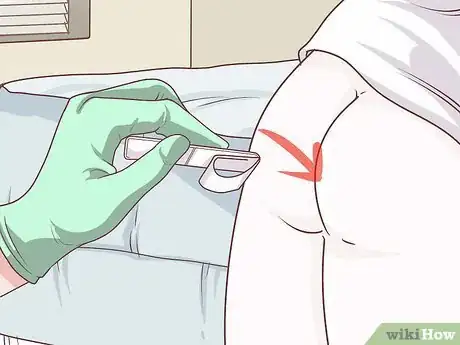
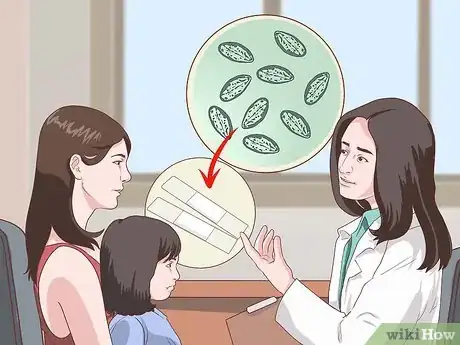
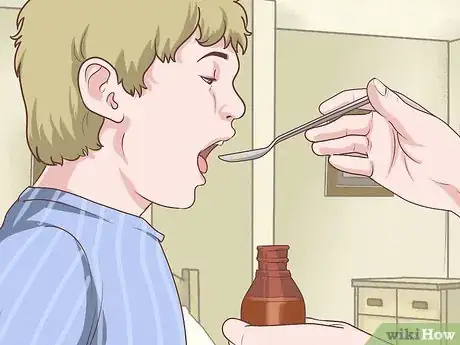
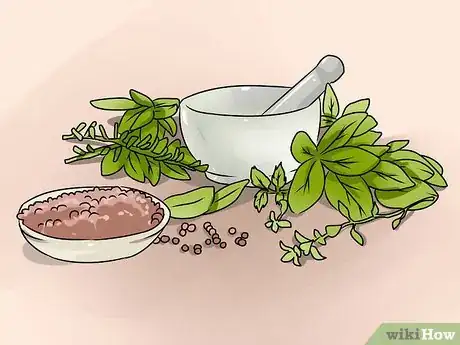
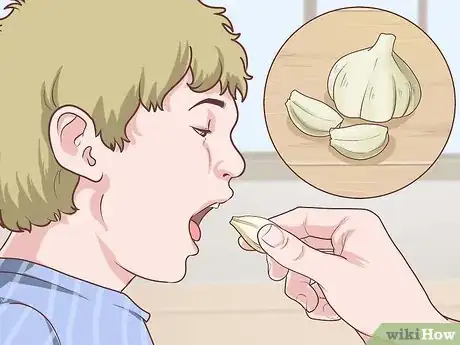
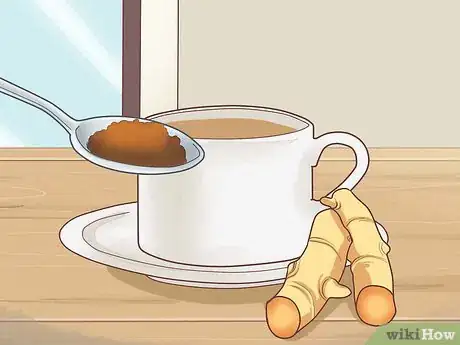

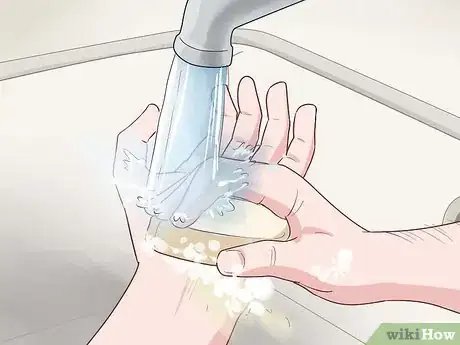
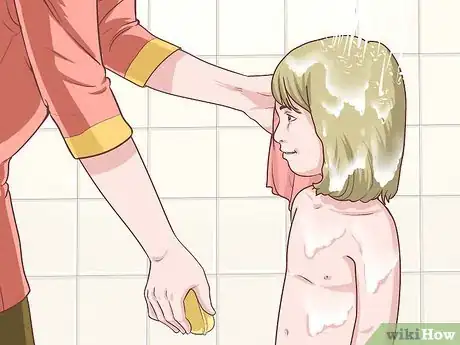
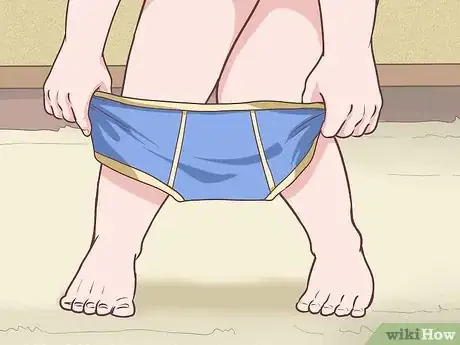
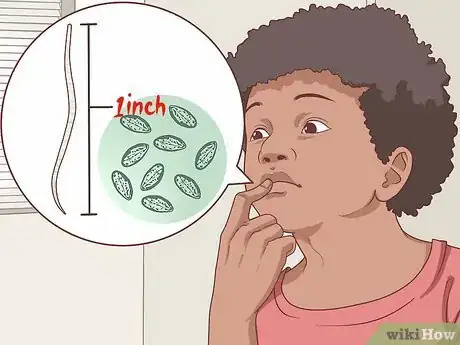
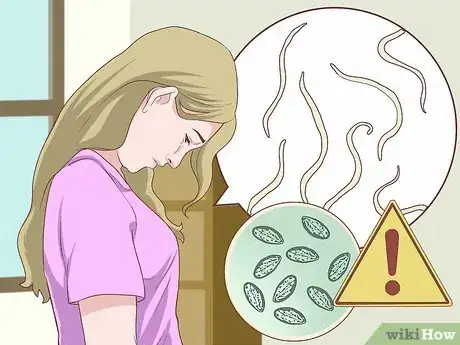
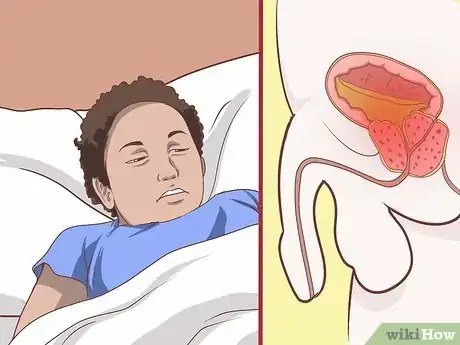
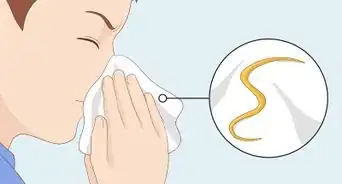
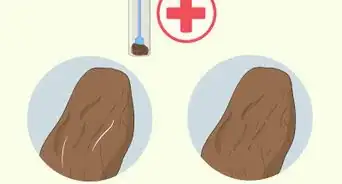


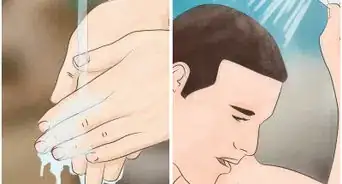
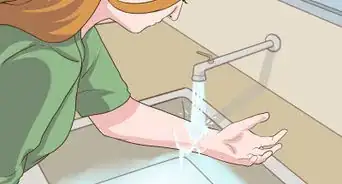
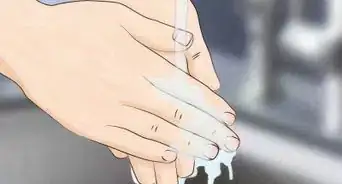

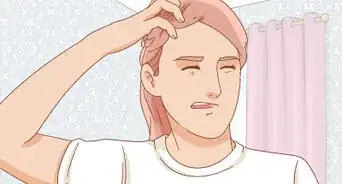
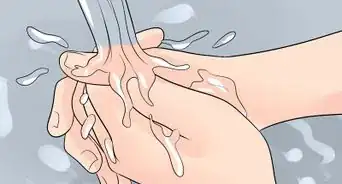












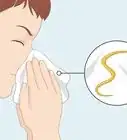
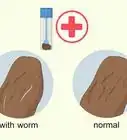





































Medical Disclaimer
The content of this article is not intended to be a substitute for professional medical advice, examination, diagnosis, or treatment. You should always contact your doctor or other qualified healthcare professional before starting, changing, or stopping any kind of health treatment.
Read More...